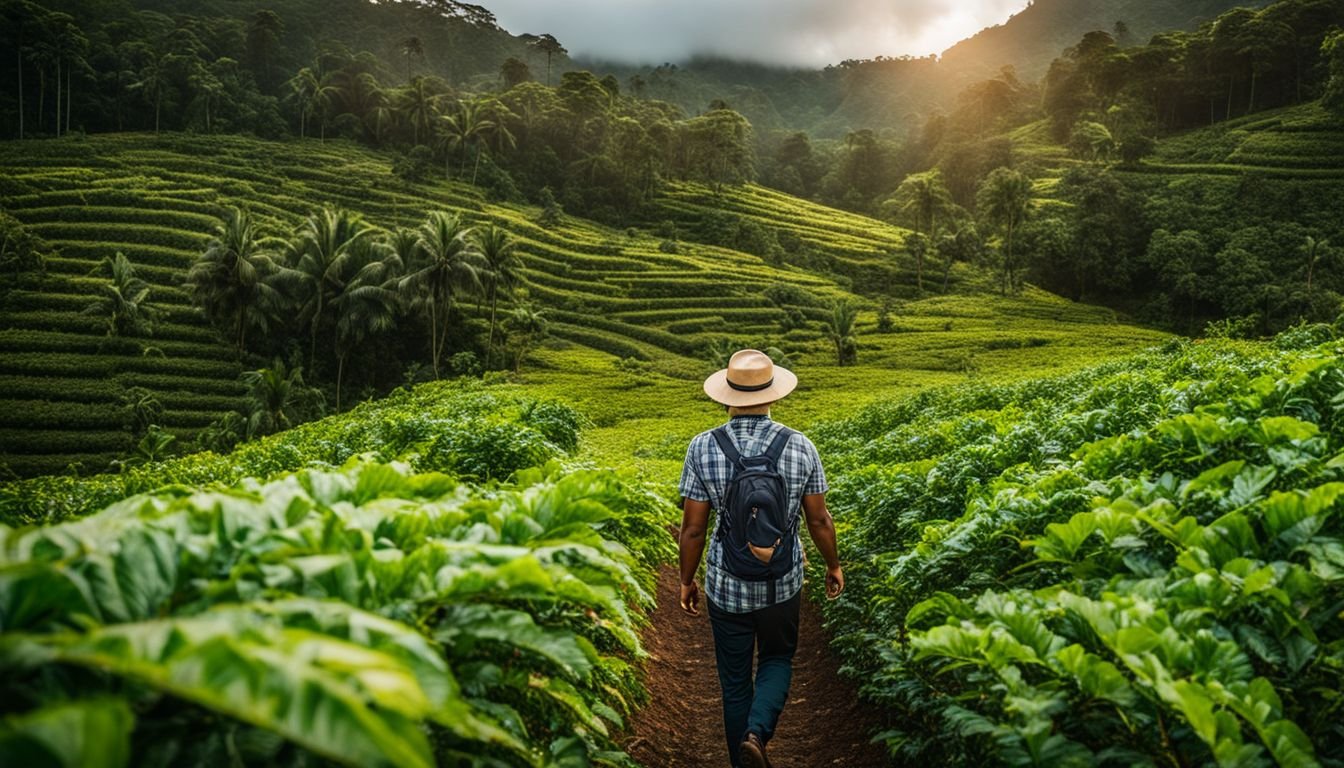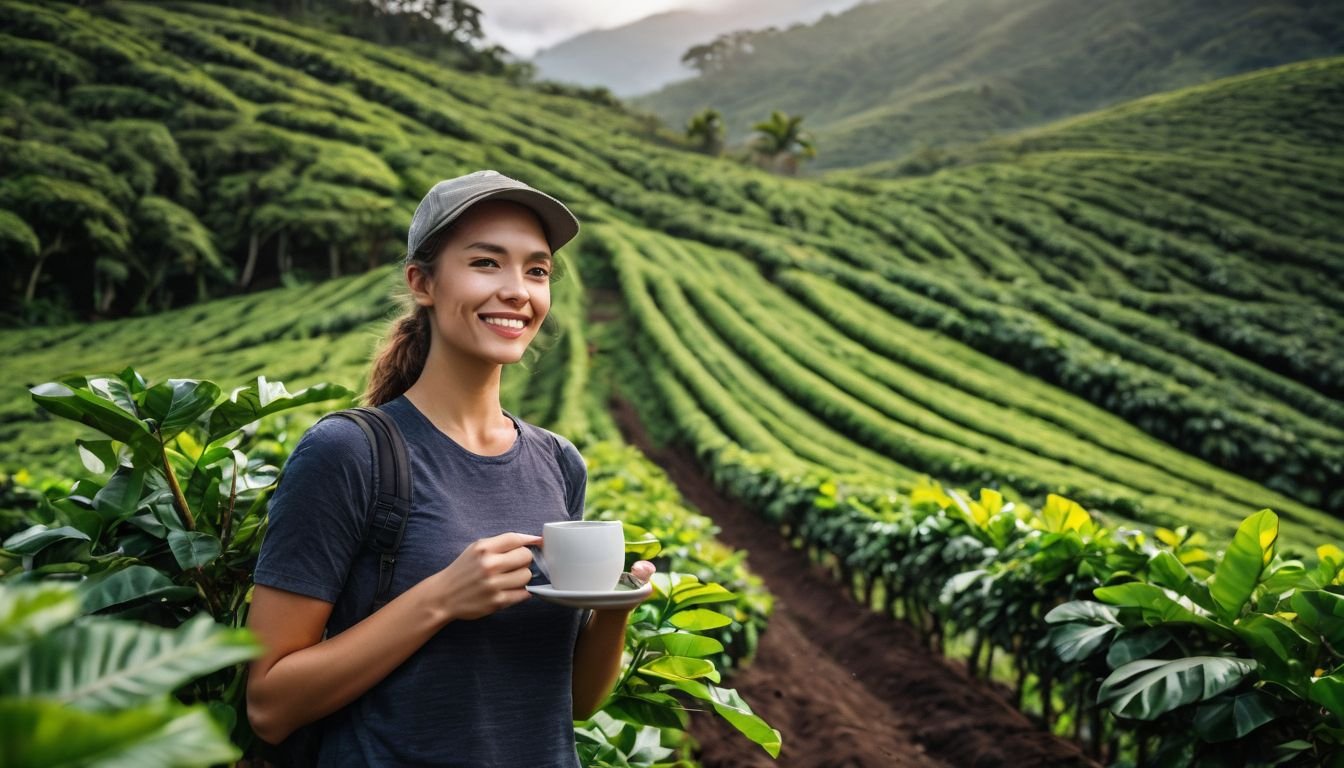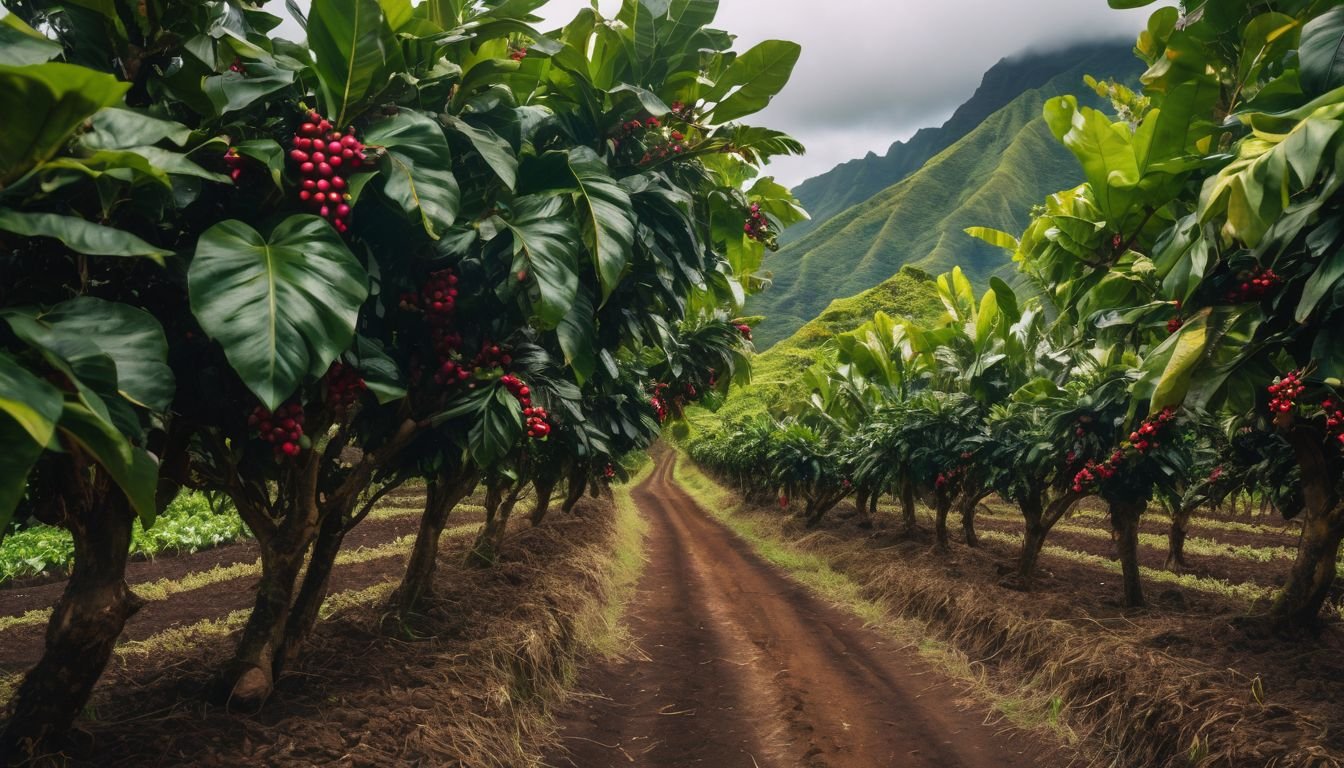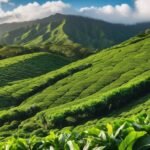Are you a coffee lover curious about the diverse flavors of Hawaiian coffee? Did you know that Hawaii is home to several unique varieties of coffee, each with its own distinct taste profile? In this article, we’ll explore 6 prominent and celebrated different types of Hawaiian coffee and help you discover which one suits your palate. Get ready to embark on an exciting journey through the world of Hawaiian coffee!
Key Takeaways
- Hawaiian coffee is famous worldwide for its quality and variety, with six unique types grown in the state’s rich volcanic soil and varied climate zones.
- Kona coffee is known for its smooth and rich flavor with nutty and fruity notes; it’s grown on the Big Island and has significant historical and economic value to Hawaii.
- Ka’u coffee from southern Big Island has won awards for its premium quality, featuring a silky taste with floral notes that distinguish it from other varieties.
- Maui coffee production is rising, offering sweet flavors influenced by the island’s climate; notable farms contribute to Maui’s reputation as a high-quality producer.
- Large plantations in Kauai have impacted the island’s industry greatly, producing smooth coffee with hints of fruitiness unlike other islands’ profiles.
Brief overview of Hawaiian coffee and its global reputation.
Hawaiian coffee stands out worldwide for its exceptional quality and taste. Thanks to Hawaii’s varied climate zones, each island produces coffee with a unique flavor. Coffee lovers everywhere know Hawaiian beans for their rich profiles, ranging from floral to nutty notes.
This reputation comes from meticulous growing on small farms and large plantations like those on Kauai, caring for over 4 million trees. With “100% Hawaiian Coffee” labels, these beans promise an authentic sip of the islands’ best flavors.
The value of Hawaiian-grown coffee hits around $50 million yearly, showing its economic importance. The state’s volcanic soil and ideal weather conditions contribute to creating this sought-after beverage.
From Kona’s famous coastlines to Maui’s rising coffee scene, every cup offers a taste distinct to its region of cultivation in Hawaii—the only U.S state with commercial production thriving across 900 ventures.
Importance of Hawaii’s unique climate and volcanic soil in coffee cultivation.
Hawaiian coffee stands out on the world stage for its taste. This fame comes from Hawaii’s special mix of weather and rich, volcanic soil. The islands are a sweet spot for growing coffee thanks to their tropical sun, rain, and good temperatures.
Each area has different climates packed into it.
The volcanic soil in Hawaii is full of nutrients that help coffee plants thrive. These soils give Hawaiian coffees like Kona and Ka’u their famous flavors. Arabica beans grow well here, including popular types such as Typica and Catuai.
Coffee lovers can thank the unique conditions of each island for every sip they enjoy.
Introduction to the diversity among Hawaiian coffee varieties.
The nutrient-rich volcanic soil and favorable climate create a perfect setting for growing coffee. In Hawaii, this leads to six distinct types of coffee, each with its own special taste and story.
These varieties are unique treasures grown in different parts of the islands, boasting flavors shaped by their specific environments.
Hawaiian coffee’s outstanding reputation comes from these diverse beans that thrive across the islands’ varied landscapes. Each variety offers something different for your cup, from Kona’s world-famous richness to Ka’u’s award-winning notes.
They all contribute to a rich tapestry of aroma and taste that you’ll love exploring sip by sip.
Kona Coffee
Kona coffee, THE most renowned Hawaiian coffee, is grown on the slopes of Hualalai and Mauna Loa volcanoes in the Kona district of Hawaii’s Big Island. It is prized for its smooth, rich flavor with nutty and fruit undertones. The mineral-rich volcanic soil and ideal climate conditions contribute to Kona’s distinctive profile. For an in-depth look at Kona coffee’s history and unique characteristics, see our article on The Rich History of Hawaiian Kona Coffee
Overview of Ka’u coffee and its emergence as a premium coffee.
Ka’u coffee, grown in the southernmost part of Big Island, offers a smooth and silky taste with delicate floral notes. It has earned recognition as a premium coffee due to the ideal climate and conditions found in Hawaii.
The region’s unique soil and climate contribute to Ka’u’s distinct flavor profile, making it stand out among other Hawaiian coffee varieties.
The emergence of Ka’u coffee as a premium choice is evident from its awards and accolades. Its smooth taste combined with a rich floral bouquet has captivated the hearts of coffee enthusiasts worldwide.
Distinct flavor notes and what distinguishes it from Kona coffee.
Emerging as a premium coffee, Ka’u coffee offers a unique taste with smooth and silky notes complemented by a floral bouquet. This flavor profile sets it apart from the rich and full-bodied taste of Kona coffee, appealing to those who enjoy subtler and more delicate flavors in their cup of brew.
The gentle hints of florals combined with its smooth texture make Ka’u coffee an intriguing choice for those seeking a different experience from the bold flavors of Kona coffee.
Puna coffee boasts nutty undertones interwoven with delightful spikes of chocolate, creating a distinct taste that differs significantly from the flavor profile found in Kona coffee.

Ka’u coffee has emerged as a premium variety with distinct flavor notes that set it apart from Kona coffee. It has received numerous awards and recognitions for its exceptional quality, making it a must-try for any coffee enthusiast.
Awards and recognitions received by Ka’u coffee.
Ka’u coffee has garnered impressive accolades, including esteemed recognition at the Specialty Coffee Assocation of America‘s prestigious coffee competition. This premium Hawaiian coffee variety has stood out among global competitors, showcasing its exceptional quality and distinct flavor profile that entices coffee connoisseurs worldwide.
The multiple awards and recognitions received by Ka’u coffee further solidify its position as a top-tier artisanal coffee, drawing attention to the unique attributes and superior taste experience it offers.
Such accolades underscore the remarkable craftsmanship and expertise of Ka’u coffee producers, elevating this variety to a renowned status within the specialty coffee community.
Maui Coffee
Maui coffee has gained popularity for its smooth and sweet flavor profile, influenced by the island’s unique climate and soil conditions. If you want to learn more about this delightful variety of Hawaiian coffee, keep reading!
The rise of coffee cultivation in Maui and the varieties grown.
Maui has become a prominent region for coffee cultivation in Hawaii, producing high-quality varieties that add to the diversity of Hawaiian coffee. The ideal climate and conditions on the island contribute to the exceptional taste characteristics found in Maui-grown coffees.
This rise in coffee production from Maui offers unique and distinct flavors that are increasingly sought after by coffee enthusiasts.
As we explore the different types of Hawaiian coffees, let’s delve into the distinct flavor notes and historical significance of Kona Coffee.
Taste characteristics and how Maui’s climate influences its profile.
Maui coffee boasts a unique flavor profile, with its taste influenced by the island’s specific climate. The climate imparts a delicate balance of acidity and sweetness to Maui coffee beans, resulting in a cup with distinct notes of caramel, brown sugar, and sweet floral undertones.
Additionally, the rich volcanic soil and ample sunshine contribute to the coffee’s full-bodied nature, making it an exceptional choice for those who appreciate nuanced flavors in their brew.
Maui’s climate plays a pivotal role in shaping the character of its coffee varieties. The warm days and cool nights create an ideal environment for cultivating beans that develop complex flavors.
Notable coffee farms and their contributions to Maui’s coffee reputation.
Maui is proud to be home to notable coffee farms, which have significantly enhanced the island’s coffee reputation. These farms play a crucial role in elevating the quality and recognition of Hawaiian coffee as a whole, adding critical acclaim to the specialty javas produced in Hawaii.
Their commitment to excellence has raised the bar for coffee production on Maui and contributed to its growing prominence in the global coffee market.
The dedication and passion of these Maui-based coffee farms have not only enhanced the island’s status as a top-tier coffee producer but have also played a key role in propelling Hawaiian coffees into international renown.
With their invaluable contributions, Maui stands out as an essential player in shaping the future of premium javas across Hawaii and beyond.
Hawaiian Kauai Coffee
– Hawaiian Kauai Coffee boasts a unique flavor profile due to its cultivation in the rich volcanic soil on the island of Kauai. Its smooth and balanced taste sets it apart from other Hawaiian coffee varieties.
– Large coffee plantations have significantly impacted the growth and success of Kauai’s coffee industry, contributing to the island’s reputation for producing high-quality beans.

Background on coffee production in Kauai.
Kauai Coffee stands out as a key player in Hawaiian coffee production, boasting the title of Hawaii’s largest coffee grower. Their sprawling 3,100-acre plantation accommodates over 4 million coffee trees.
The region’s large plantations have significantly shaped Kauai’s coffee industry, making it one of the prime contributors to Hawaii’s global reputation for exceptional coffee.
To sustainably produce high-quality beans, Kauai Coffee has implemented meticulous harvesting and processing methods on its vast estate. These efforts contribute to the rich flavors and diverse notes found in their coffees, reflecting the unique climate and soil characteristics that distinguish Kauai from other Hawaiian islands.
Flavor profile and how it differs from coffees on other islands.
Moving from the background on coffee production in Kauai to exploring its flavor profile and how it differs from coffees on other islands, Kauai coffee showcases a unique blend of flavors.
With a mild acidity and annual output akin to Kona, this variety stands out for its smooth body with subtle hints of fruity and nutty notes. The combination of volcanic soil and abundant rainfall creates a distinct taste that sets it apart from the bolder profiles found in other Hawaiian island coffees.
The difference in flavor can be attributed to the specific microclimates and altitudes on each island, resulting in variations in bean quality and taste characteristics. This gives coffee aficionados an exciting opportunity to experience a diverse range of flavors within Hawaii’s renowned coffee offerings.
The impact of large coffee plantations on Kauai’s coffee industry.
Shifting from understanding the flavor profile and how it differs from coffees on other islands, let’s delve into the impact of large coffee plantations on Kauai’s coffee industry.
Kauai Coffee takes center stage as one of the largest producing regions in Hawaii, matching Kona’s annual output. With over 4 million coffee trees spread across 3,100 acres, it stands out as a major contributor to Hawaiian coffee production.
Kauai Coffee has committed itself to environmentally sustainable practices throughout cultivation and production. This includes employing eco-friendly methods at every level – from harvesting to roasting – ensuring that its growth doesn’t compromise the island’s delicate ecosystem.
Molokai Coffee
Molokai coffee has a rich history of cultivation on the island, producing unique flavors and attributes. Despite challenges, Molokai coffee producers have achieved recognition for their high-quality beans.
History of coffee cultivation on Molokai.
Coffee cultivation on Molokai dates back to the 19th century when its rich volcanic soil and temperate climate became an ideal setting for coffee production. The island’s coffee industry flourished, establishing a unique heritage in the world of Hawaiian coffee.
Molokai coffee is deeply intertwined with the island’s history, reflecting the hard work and dedication of local farmers who have sustained this tradition for generations. Today, Molokai continues to produce exceptional coffee known for its distinctive flavors, contributing to Hawaii’s diverse and vibrant coffee culture.
The history of coffee cultivation on Molokai remains an integral part of the island’s identity, representing a legacy that blends tradition and innovation in every aromatic cup brewed from its cherished beans.
Unique attributes and flavors of Molokai coffee.
Molokai coffee, cultivated in a traditional 490-acre plantation, boasts a rich flavor and distinct attributes. The meticulous cultivation process contributes to its unique taste profile, characterized by notes of smooth chocolate and hints of citrus.
Grown in the island’s specific climate and volcanic soil, Molokai coffee captures the essence of its tropical surroundings, offering coffee enthusiasts an exquisite and unforgettable sensory experience.
With its exceptional attributes derived from the island’s environment and production methods, Molokai coffee stands out as a true gem among Hawaiian varieties. Its flavors reflect the care and dedication put into every step of its cultivation – from harvesting to roasting – making it a must-try for anyone seeking an authentic taste of Hawaii’s coffee excellence.
Challenges and achievements of Molokai coffee producers.
Now, shifting the focus to the challenges and achievements faced by Molokai coffee producers. Competing with other renowned Hawaiian coffee varieties poses a significant challenge for these dedicated producers in showcasing their unique flavors and cultivation methods.
While Molokai’s coffee possesses distinct attributes and an intriguing flavor profile, standing out in the competitive coffee market requires innovative strategies that highlight its exceptional qualities.
Molokai coffee producers have a prime opportunity to triumph over these challenges by leveraging their rich history of cultivation and heritage. By emphasizing sustainability, ethical sourcing practices, and promoting the cultural significance of Molokai’s coffee, they can carve a niche for themselves in the global market.
Oahu Coffee
Introduction to coffee production in Oahu, highlighting the unique characteristics and quality of Oahu coffee. Find out more about this lesser-known Hawaiian coffee variety!
Introduction to coffee production in Oahu.
Oahu, known for its stunning beaches and rich culture, is also home to a burgeoning coffee industry. The unique microclimates and fertile volcanic soil make Oahu an ideal location for cultivating high-quality beans.
With the rise of small farms and a focus on sustainability, Oahu’s coffee is gaining recognition for its distinctive flavors and exceptional quality.
As the desire for single-origin and estate coffees grows, Oahu’s coffee producers are embracing innovation while honoring traditional craftsmanship. The island’s dedication to eco-friendly practices ensures that each cup of Oahu coffee tells a story of heritage, legacy, and the island’s commitment to sustainable agriculture.
Characteristics and quality of Oahu coffee.
Oahu coffee is characterized by its diverse flavor profiles, influenced by the island’s unique climate and volcanic soil. The coffees from Oahu boast a range of flavors, from rich and chocolaty notes to vibrant floral and fruity undertones.
The high altitude at which Oahu coffee is grown contributes to its bright acidity and well-balanced body, making it a delight for coffee enthusiasts seeking complexity in their brews.
The quality of Oahu coffee is underscored by sustainable farming practices and meticulous harvesting methods employed by local growers. With an emphasis on organic cultivation and eco-friendly processes, Oahu coffee embodies a commitment to both environmental stewardship and exceptional taste.
Efforts to revitalize and expand coffee cultivation on Oahu.
To revitalize and expand coffee cultivation on Oahu, sustainable practices and innovative techniques are being embraced. Local farmers are focusing on cultivating unique bean varieties that thrive in Oahu’s specific climate and soil conditions.
Additionally, there is a concerted effort to educate and involve the community in supporting local coffee production, ensuring its sustainability while maintaining high-quality standards.
Moreover, through eco-friendly approaches and fair trade initiatives, the aim is to not only increase Oahu’s coffee output but also create a positive impact on the environment and local economy.
Conclusion
In conclusion, Hawaiian coffee offers a diverse range of flavors and characteristics, each shaped by the unique climates and conditions of their respective regions. The future of Hawaiian coffee looks promising as efforts continue to innovate and expand its presence in the world market.
While renowned Kona coffee showcases a unique legacy shaped by Hawaii’s volcanic slopes, the islands contain rich diversity across coffee varieties thriving in distinct regional conditions.
Hawaiian coffee boasts several diverse varieties, each offering a unique flavor profile and characteristics. Kona coffee, with its smooth and full-bodied taste, is renowned for its historical and economic significance in Hawaii.
Ka’u coffee emerges as a premium choice with distinct flavor notes, earning recognition through various awards. Maui coffee captures attention with its exceptional taste influenced by the island’s climate while Hawaiian Kauai coffee delivers a unique flavor distinct from other islands.
Molokai coffee showcases unique attributes and flavors despite facing production challenges, and Oahu coffee demonstrates quality and depth of character amid efforts to revitalize cultivation.
The significance of regional differences in shaping the flavor profiles of Hawaiian coffees.
In understanding the significance of regional differences in shaping the flavor profiles of Hawaiian coffees, it’s crucial to recognize Hawaii’s diverse growing regions. With ten climate zones in close proximity, each area – from the cool slopes of Mauna Loa to the sun-drenched fields of Kona – imparts its unique environmental factors on the coffee plants.
This variation influences everything from acidity and body to aroma and distinctive flavor notes, creating a rich tapestry of tastes that reflect Hawaii’s geographical diversity.
The unique environmental factors found across Hawaii contribute to the exceptional flavors of its coffees. Nutrient-dense volcanic soil, coupled with a blend of tropical sun, rain, and temperatures specific to each region, result in a range of taste experiences for coffee lovers
Final thoughts on the future of Hawaiian coffee and its place in the world market.
The significance of regional differences in shaping the flavor profiles of Hawaiian coffees leads to a promising future for the state’s coffee industry. With sustainable and organic practices gaining momentum, Hawaiian coffee is poised to capture more attention on the global stage.
As coffee lovers continue to seek unique and high-quality brews, Hawaii’s diverse varieties hold great potential to carve out a larger niche in the world market. The culinary importance and exceptional taste of Hawaiian coffee align perfectly with the growing demand for distinctive flavors, setting the stage for an exciting journey ahead.
Hawaiian coffee possesses a rich legacy rooted in its volcanic soil and tropical climate, offering an unmatched experience for those seeking new taste exploration opportunities. With efforts focused on innovation, sustainability, and quality improvement, Hawaii’s position as a prominent player in the world market is set to further solidify its place as one of the top destinations for premium coffee experiences.
FAQs
1. What makes Hawaiian coffee unique?
Hawaiian coffee is special because of its quality and diverse flavors that come from the unique climate, altitude effects, and coffee traditions found in Hawaii.
2. Can you tell me about different Hawaiian coffee varieties?
Yes! There are six diverse varieties of Hawaiian coffee, each with its own body, acidity, aroma, and notes that make it perfect for different recipes and pairings.
3. How is Hawaiian coffee grown and made?
Coffee in Hawaii goes through careful harvesting, processing, roasting, and sometimes even special ceremonies to preserve its rich history while using both traditional methods and innovative techniques.
4. Are there eco-friendly coffees in Hawaii?
Absolutely! Many farms focus on sustainable coffee practices including organic farming fair trade standards which make their products eco-friendly.
5. How does altitude affect the taste of Hawaiian Coffee?
Coffee plants at higher altitudes grow slower due to cooler temperatures giving them a richer flavor; this means the altitude can give your cup an extra delicious boost!
6. Can I visit a Hawaiian coffee farm to learn more?
Sure thing! Coffee tourism is popular in Hawaii where you can join events or tours that let you experience firsthand how they cherish every step of their precious bean’s journey.






